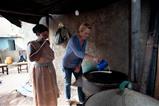After a life-change injury Macaila Britton thought her church would rally around her, but instead she claims she was ostracized and asked to leave for giving up her volunteer roles.
Nearly five years ago, I was hit in the head with a baseball bat and sustained a traumatic brain injury. As hard as they tried, eight stitches couldn’t put together my life and I had to adjust to what would become the new normal. While I learned to navigate new limitations, I wasn’t expecting my wounds to include the church.

I had served as a regular leader and apprentice. When members of the leadership team called to say I was “disappointing God” and “seeking attention”, after relaying inability to resume those volunteer roles, my anxiety spiked. I thought the church, which preached supporting others and community, would rally around me. My appearance was puffy, bruised, and it looked like I had a giant caterpillar sewn into the middle of my face. I wasn’t trying to sin or cause people harm. I didn’t want to take on responsibility I could not steward— it had nothing to do with my relationship with God or my place as a member of the church.
I thought the church, which preached supporting others and community, would rally around me.
As the weeks progressed, the church left voice mails screaming at me and spread rumors. Strings of texts I could barely focus my eyes long enough to read, told me that I was unreliable. I was trying to rest but my time was spent searching for what I was doing wrong or consoling other people for my injury. A month after that, when I was still on bed rest, I was asked not to come back to church because I’m not a leader they seek— my actions weren’t “reflecting Christ”. My heart felt like how my face looked—unrecognisable, out of place, and damaged.
I struggled to understand my relationship with God. I hadn’t turned my back on him, but I hadn’t regularly gone to him. God and I were in an awkward stage. It was like when you see someone you know at the supermarket and can’t remember their name but it’s past the point where you can ask for it again and so you stand there exchanging pleasantries hoping they don’t catch on.
I was asked not to come back to church because I’m not a leader they seek, my actions weren’t “reflecting Christ”.
I was my own accountability. While I longed for community and worship, I realised I could do it on my own, but I rarely did before my injury. I’d accidentally used the church as my crutch and that was the only way I knew the Father. My relationship hadn’t been with God, it was with a building and the people within it. From then on, I started to meet him on my own.
I understood people’s sins—including the church, aren’t an extension of God. He isn’t petty or bully-like but a disciplinary—and not toxic. Of my many discoveries during this time, I found comfort in how he welcomed me without tallying up my needs or placing a time limit on how often I could turn to him. I found comfort on my worst days knowing I didn’t have to justify my feelings. God knew I was trying and how I felt like a stranger in my own body. I didn’t have to defend my pain—physically or emotionally.
I found comfort in how God welcomed me without tallying up my needs or placing a time limit on how often I could turn to him.
Ultimately, God doesn’t penalise us for needing rest or admitting we’re weak or in the process of healing—he doesn’t think less of us either. Despite not having set foot in church since mine bullied me after a brain injury, I’m closer to God than ever because my relationship isn’t exclusive to church, community, or activities‚—even if they do honor Christ. God revealed to me how funny and nurturing he is. He’d drop a clue here and there in my life to let me know he was with me. I didn’t need to approach God through a human third-party, or see him through a filter, in order to know Him.





































No comments yet